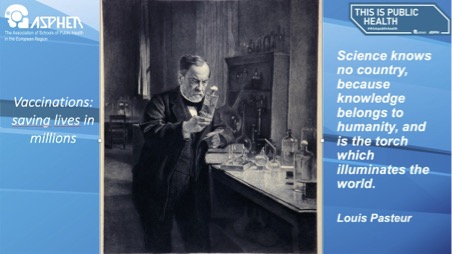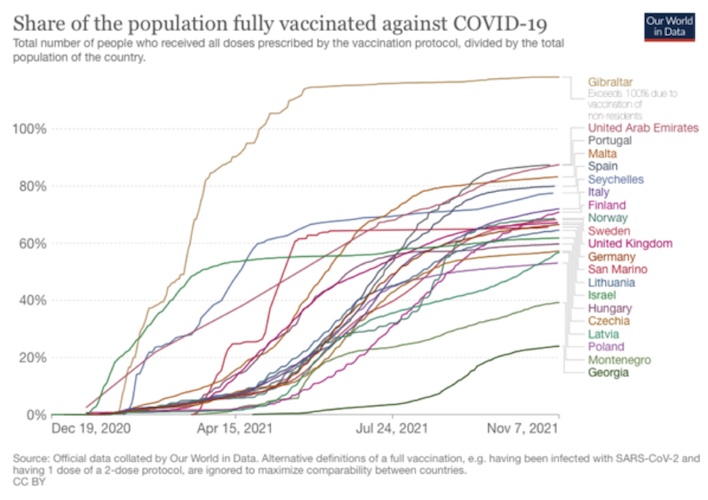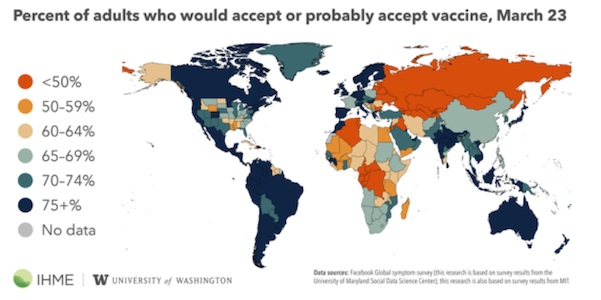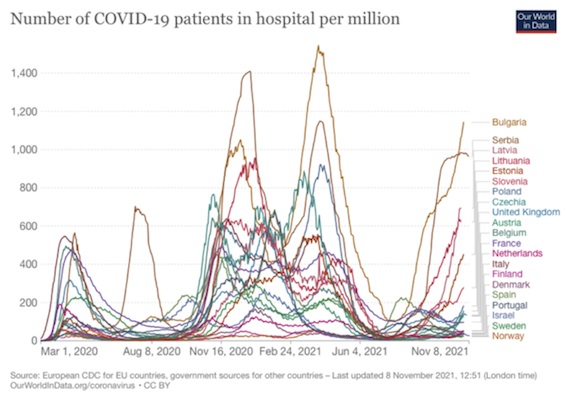This autumn, I have been greatly exercised by vaccination. I was delighted to be able to present my thoughts to forums in France, Spain, in Israel (twice) and in the UK. For a meeting of the Grand Colloque European on training, research and education for the Europe of Health, at the Sorbonne, I paid homage to Louis Pasteur, Father of immunisation. He said, ‘Science knows no country, because knowledge belongs to humanity, and is the torch which illuminates the world.’ This is timely and bitter-sweet in the light of the incredible international success of science in creating new vaccines for COVID-19, and the darkness of our failure to vaccinate the world. ASPHER, has been joined by the Global Network for Academic Public Health and the World Federation of Public Health Associations in calling for a Vaccine Trade-Related Intellectual Property Rights waiver to enable global capacity to be built to produce vaccines for the continuing pandemic.

My presentation for the Spanish Forum of Vaccination and Public Health, Alcala de Henares, Madrid, Spain, on the 18th of October, 2021, was delivered via video recording now available here. It covered my thoughts on a lifetime in implementing vaccination programmes, 26 of them over 27 years at local level, with much experience on measles. My thoughtsprogressed through to current lessons for COVID-19 vaccination programmes.
Ten points about COVID-19 and vaccination
Here are ten points I think hold true on our present state of knowledge of vaccination and COVID-19, mainly from the European experience. You may disagree-please discuss. It is not an exhaustive list and there are many other questions still to be answered.
- Vaccination is still the best hope we have in reducing the virus to very low levels, and prevent deaths and disability from the disease. Countries which have the highest rates of vaccination have seen an encouraging levelling of their cumulative death rates through this year.
- It is still too early to see collective (‘herd)’ immunity even in countries where there is a very high level of vaccination, or where there have been persistent waves of infection, as in Iran.
- Reinfection occurs, especially with the delta variant.
- Vaccine efficacy declines.
- There is still a high level of efficacy from vaccines against delta variant, although less than with early variants.
- There are areas of low vaccine uptake within countries and with social mixing, these weaken a country’s ability to suppress the virus.
- In the UK there are areas where confidence in vaccine is being improved through by support from local public health teams and community support, but more investment is needed in local action.
- Vaccines prevent serious illness as measured by hospital admission and death but we do not know if they prevent debilitating illness-‘persistent’ or ‘long COVID’?
- Vaccines are not preventing transmission. The virus spreads even in fully vaccinated households.
- Social mixing without masking enables the virus to find new unprotected, vulnerable people to infect and harm. Every time the virus finds a new host, new mutations will occur, and new potentially more vaccine-resistant variants will be formed, in the ‘new variant factories’
So vaccination is not the sole answer.
The European Vaccination Stakes
Malta, Spain, Portugal, the Netherlands, Italy and Scandinavia have now overtaken UK and Israel in the Vaccination Stakes. The United Arab Emirates (a valued ASPHER Associate Member) continue to excel in vaccination coverage (Figure 1).

France, which had a high level of vaccine hesitancy, has climbed up to a comparable level of coverage to the UK, partly because the French are using vaccine passports. In some Eastern European countries, health systems have been less well prepared to implement mass vaccination, or lost out in the chaotic EU central purchase earlier this year. The systematic disinformation supplied on an industrial scale by Russia and other Eastern European countries has now backfired badly on them as they have become victims of mass vaccine hesitancy (Figure 2). There are very high rates of COVID-19 infection in Eastern Europe and deaths consequent on low rates of vaccination. ASPHER will continue to offer our support to colleagues battling to grow vaccine confidence in their countries.

Across Europe, there has been too much political attraction to single technological fixes- testing, vaccination, vaccine passports, contact apps. We need to keep reminding ourselves of the ‘Swiss-cheese model’ — using everything we’ve got at the same time to prevent viral spread. Many European countries which are now enjoying high levels of double vaccine coverage, kept their social measures in place. Masks have continued to be a requirement in public enclosed spaces in France, Portugal, Spain. Germany requires FFP2 masks in enclosed public spaces, and vaccine passports. Gatherings in public places have been strictly limited in Portugal and Spain until recently, despite high levels of vaccine cover. France, Ireland, Montenegro and Israel are other examples of countries requiring vaccine passports.
As we go into the winter, health services in most European countries are experiencing rising pressures in hospital admission (Figure 3). Even in well-vaccinated Portugal, hospitals are failing to cope with other care needs, and grappling with staff burnout.

I fear, for my country, the deadly indecision and incompetence will go on too long and too far. The world’s scientific community is watching what happens when COVID is allowed to run wild in the UK.
Despite all the warnings from ASPHER’s winter planning papers, it appears we are all about to make the same mistakes again…
Living with COVID does mean masking up in enclosed spaces, meeting outdoors when possible, working from home if we can; and if we can’t do without our night-time entertainment it means vaccine passports. Vaccination, or evidence of a recent negative test are small price to pay for ‘normality’. Many nations now have more than 80% of their populations doubly vaccinated, so only a minority should be unhappy to have to show evidence of vaccination. It is now also clear that many countries including Netherlands, Ireland, Luxembourg, Denmark, Greece, Norway, the Baltic states are re-applying non-pharmaceutical measures to support their vaccine protections and outbreak controls. It is surprising how rapidly these changes came about- a month ago many countries were relaxing in ‘peak vaccination protection’ confident that their pandemic was nearly over. I hope, for many, their realisation that they must re-impose social control measures, will not have come too late, for the collapse of their health care, for preventable deaths and suffering from non-COVID conditions.
Professor John Middleton
President, ASPHER
November 11th 2021





